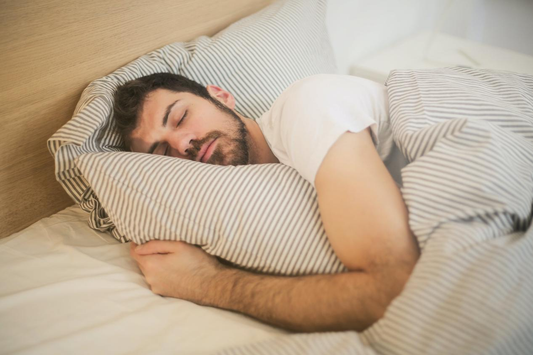How Blue Light Affects Melatonin Production

💡 1. Blue Light and Melatonin Suppression:
Light, particularly in the blue spectrum, inhibits the production of melatonin, a hormone that regulates sleep-wake cycles.
Screens emit a high proportion of blue light, especially in the evening when the natural environment is darker.
💡 2. Disruption of Circadian Rhythms:
Blue light exposure in the evening can confuse the body's internal clock (circadian rhythm), signaling that it is still daytime and delaying the release of melatonin.
This delay can make it harder to fall asleep at the desired bedtime.
💡 3. Effects on Sleep Quality:
Reduced melatonin production can lead to fragmented sleep, decreased deep sleep, and an overall lower quality of sleep.
Studies suggest that exposure to blue light before bedtime is associated with insomnia symptoms and disturbances in sleep architecture.

The Importance of Melatonin for Sleep
💡 1. Regulation of Sleep-Wake Cycles:
Melatonin is a key player in regulating the body's natural sleep-wake cycles, helping to synchronize the internal biological clock with the external environment.
It is produced by the pineal gland in response to darkness, signaling that it is time to wind down and prepare for sleep.
💡 2. Induction of Sleep:
Melatonin acts as a natural sleep aid, promoting drowsiness and facilitating the transition from wakefulness to sleep.
Its release is triggered by the absence of light, making it a crucial factor in the initiation of the sleep process.

💡 3. Antioxidant Properties:
Melatonin also possesses antioxidant properties, which may contribute to overall health and well-being.
The antioxidant effects are thought to be particularly important during the restorative processes that occur during deep sleep.
Minimizing Blue Light Exposure Before Bedtime
💡 1. Establishing a Digital Curfew:
Set a specific time before bedtime to stop using electronic devices to allow melatonin levels to rise naturally.
Consider using features like Night Shift (iOS) or Night Mode (Android) that reduce the blue light emitted by screens during the evening.
💡 2. Blue Light Blocking Glasses:
Wear blue light-blocking glasses in the evening to reduce the impact of screen-related blue light exposure.
These glasses filter out a significant portion of blue light, helping to maintain melatonin production.
💡 3. Dimming Screens and Ambient Lighting:
Adjust screen brightness to the lowest comfortable level in the evening.
Use soft, warm-colored ambient lighting in the hours leading up to bedtime to create a sleep-friendly environment.
💡 4. Investing in "Sleep-friendly" Products
Such as Sleep-friendly Light Bulbs, Blue Light Blocking Glasses, Moisture-wicking sleepwear and bedding.

Recommendations: Harmony Cool Shredded Cooling Memory Foam Pillow
https://egohome.com/products/harmony-cool-pillow
By helping you understand the relationship between blue light exposure, melatonin production, and the importance of melatonin for sleep, individuals can make informed choices to optimize their sleep hygiene and promote better overall sleep quality.
Feel free to share your own experiences and tips in the comments.
Provide additional resources for those interested in learning more about sleep hygiene.
Good night!


